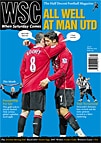 There are no official feeder clubs in England, to the relief of Jon Spurling. But, as he reports, Arsenal and others are busy doing abroad what they can’t get away with at home
There are no official feeder clubs in England, to the relief of Jon Spurling. But, as he reports, Arsenal and others are busy doing abroad what they can’t get away with at home
Feeder clubs are very much in vogue – and not always in the expected places. Blackpool’s Latvian director Valery Belokon is currently setting up a “farm club” in his homeland and Sheffield United, who already control Chinese side Chengdu Blades, are discussing a link-up with Sparta Rotterdam. Top clubs – Manchester United with Royal Antwerp, Arsenal with Beveren – led the way.
Critics see the feeder system as a soulless practice, which removes the potential for promotion and relegation, and simply protects the wealthy. Real Madrid, as well as plucking raw talent from local clubs, paying undisclosed sums in order to keep their nursery outfits in the shadows, have an official B team. Castilla even qualified for the Cup-Winners Cup in 1980-81 after being beaten in the Spanish Cup final by the Real senior side, who had already won La Liga. Like other reserve sides in Spain they are permitted to play in the second division, to which they returned in 2005 after eight years at the third level.
In Italy, there exists a long established practice of Serie A sides raiding local teams for burgeoning talent and paying an annual fee for the privilege. Similar “unofficial” arrangements exist in Portugal.
Yet as former Belgium star Frank Vercauteren recently commented on Belgian TV, it’s the insidious change of term from “nursery” to “feeder club” which raises questions as to the ethics of such arrangements. Rather than simply giving reserves the chance of first-team football and providing the chance to exchange training ideas, Vercauteren suggests: “The feeder club system is now overloaded in favour of the bigger clubs and displays many of the ills of modern global football.”
Arsenal were the English pioneers of nursery clubs. In 1934, the Gunners set up links with Southern League Margate Town, appointing former striker Jack Lambert as manager and insisting that Town shrink their Hartsdown pitch to match Highbury’s compact configurations. “This arrangement,” commented manager George Allison in his autobiography, “benefits both clubs splendidly. Margate have done better in their league as a result, and picked up some fitness tips along the way, and some of our young lads are much fitter and sharper than they would be otherwise.”
Arsenal’s modern relationship with Beveren appears far murkier and has attracted the interest of FIFA. August’s Newsnight feature raised several uncomfortable facts about the arrangement, even if the club were cleared of financial wrongdoing. Arsenal’s £1 million investment in Beveren in August 2001 – Premier League rules prohibit members from holding shares in other teams – included a £205,000 interest-free loan, ratified by vice-chairman David Dein, made payable to one Raoul de Waele. The money was subsequently used to pay the Goal company, in which Arsenal were the principal shareholder. This in turn would be used to set up another company to buy Beveren. No mention of this was made in the loan agreement between the two clubs.
Guided by Jean-Marc Guillou, previously Arsène Wenger’s assistant at Cannes, Beveren were “encouraged” to buy the most talented Ivorians, nurture them and, in the case of Emmanuel Eboué, sell them on for a profit to Arsenal. The majority of the profits from the sales went to Goal and Guillou, which indirectly benefits the Gunners.
After a Spanish newspaper suggested that the Gunners were also proposing to formalise a link with La Liga outfit Malaga, a spokesman for that club commented: “They [Arsenal] are trying to get in with us so that Brazilian and Argentine players can play here for a couple of years, gain Spanish passports and then play in London. Clubs like Arsenal and Chelsea seem to want to control which nationality players go where.”
Last year, Chelsea’s “close financial relationship” with CSKA Moscow was also investigated by FIFA. “Most CSKA players call themselves Chelsea reserves,” Jiri Jarosik revealed – Roman Abramovich was a major shareholder in Sibneft, CSKA’s sponsor. “This whole practice,” argued Sepp Blatter, in a rare moment of clarity, “is becoming increasingly shady and could hide a multitude of sins.”
Premiership clubs, anxious to prune and manage their gigantic squads, farm out younger players to select lower-league clubs in increasingly large numbers. Formalised feeder arrangements, currently banned by the FA, have long been mooted in England. But, thankfully, that is unlikely to change. As Vercauteren commented: “Although there are always varying degrees of scale, we must remember that feeder clubs are set up by the rich to feed the rich.”
From WSC 24o February 2007. What was happening this month